Why this resume works
- Quantifies accomplishments: Includes measurable accomplishments, such as reducing ER visits by 20% and improving documentation efficiency by 30%, illustrating the job seeker’s tangible impact.
- Showcases career progression: Showcases career progression from a registered nurse to a nurse practitioner, highlighting increased responsibilities and advanced roles over time.
- Uses action-oriented language: Strong action verbs like “provided,” “reduced,” and “administered” effectively demonstrate proactive contributions in each role.
More Nurse Practitioner Resume Examples
Explore more nursing resume examples to see the best ways to highlight your clinical expertise, patient care, and diagnostic skills. These examples will guide you in creating a resume that showcases your healthcare proficiency and experience.
Entry-Level Nurse Practitioner
Why this resume works
- Features an education section: The education section highlights academic achievements, mentioning honors and Dean’s List status, which is essential for early-career credibility.
- Touches on awards and recognition: Awards like Employee of the Month and Best Patient Care Initiative validate the job seeker’s exceptional performance and contributions in their roles.
- Shows digital literacy: References to healthcare technology skills illustrate modern workplace readiness, demonstrating proficiency in utilizing advanced tools to enhance patient care.
Mid-Level Nurse Practitioner
Why this resume works
- Showcases impact: Emphasizes impact by detailing quantifiable achievements, such as increased recovery rates and reduced errors, which highlight the tangible benefits provided to past employers.
- Demonstrates language abilities: Showcases language skills through proficiency in English, Spanish, and French, emphasizing cross-cultural communication abilities essential for working with diverse patient populations.
- Clear contact information: Clearly displayed contact information ensures that potential employers can easily contact the job seeker to schedule an interview.
Experienced Nurse Practitioner
Why this resume works
- Lists relevant certifications: The resume lists multiple relevant certifications, underscoring a commitment to continuous learning and specialized nursing skills in advanced cardiac and pediatric life support.
- Showcases impressive accomplishments: Impressive accomplishments like reducing ER visits by 20% and improving patient satisfaction by 30% showcase the candidate’s significant impact at senior levels.
- Emphasizes leadership skills: Leadership skills are evident through roles managing large patient volumes, supervising junior staff, and implementing successful health plans that enhanced team efficiency.
Nurse Practitioner Resume Template (Text Version)
Daniel Patel
Riverview, FL 33587
(555)555-5555
Daniel.Patel@example.com
Professional Summary
Experienced Nurse Practitioner with 9 years fostering patient care, chronic disease management, and emergency response. Proven success in improving patient outcomes and clinic operations. Fluent in Spanish and committed to education and wellness promotion.
Work History
Nurse Practitioner
Harmony Health Center – Riverview, FL
January 2022 – March 2025
- Provided primary care to 50+ patients weekly
- Reduced ER visits by 20% via outpatient care
- Implemented EHR system, improving documentation efficiency by 30%
Advanced Practice Registered Nurse
Riverside Medical Group – Tampa, FL
January 2017 – January 2022
- Managed chronic conditions for 100+ patients
- Increased patient satisfaction scores by 15%
- Facilitated monthly wellness workshops
Registered Nurse
Meadowbrook Clinic – Tampa, FL
January 2016 – January 2017
- Assessed and triaged emergency cases
- Administered medications to 200+ patients daily
- Developed patient care plans, reducing readmission rates by 10%
Skills
- Patient Care
- Chronic Disease Management
- Emergency Response
- Electronic Health Records
- Patient Education
- Medication Administration
- Health Assessments
- Wellness Promotion
Education
Master of Science in Nursing Family Nurse Practitioner
University of Illinois at Chicago Chicago, Illinois
December 2015
Bachelor of Science in Nursing Nursing
Illinois State University Normal, Illinois
December 2012
Certifications
- Certified Family Nurse Practitioner – American Nurses Credentialing Center
- Basic Life Support (BLS) – American Heart Association
Languages
- English – Beginner (A1)
- Spanish – Beginner (A1)
- French – Intermediate (B1)
Popular Skills for a Nurse Practitioner Resume
A strong resume skills section is essential for showcasing hard skills like medical knowledge and soft skills such as empathy and communication.
Below are a few of the top soft skills frequently listed on nurse practitioner resumes.
| Soft Skills | % of resumes with this skill |
|---|---|
| Interprofessional collaboration | 59.02% |
| Sound judgment | 5.56% |
| Cultural competence | 5.00% |
| Therapeutic intervention | 4.23% |
| Community outreach | 3.13% |
Here are a few examples of hard skills frequently included on nurse practitioner resumes.
| Hard Skills | % of resumes with this skill |
|---|---|
| Patient education | 56.30% |
| Preventive care | 55.37% |
| Health promotion | 54.17% |
| Chronic disease management | 30.12% |
| Diagnosis and treatment | 28.40% |
Related Resume Guides
- Geriatric Nurse Practitioner
- Hemodialysis Nurse
- Intensive Care Nurse
- Labor And Delivery Nurse
- Licensed Practical Nurse
- Neonatal Intensive Care Unit Nurse
- Neonatal Nurse
- Nurse Aide
- Nurse Care Coordinator
- Nursing Assistant
- Obgyn Nurse
- Oncology Nurse
- Operating Room Nurse
- Pediatric Nurse
- Perioperative Nurse
- Pre Post Op Nurse
- Private Duty Nurse
- Registered Nurse
- School Nurse
- Trauma Nurse
Advice for Writing Your Nurse Practitioner Resume
Check out our tailored advice on how to write a resume specifically for nurse practitioners. Discover how to highlight your advanced clinical skills, patient care experience, and dedication to healthcare excellence in a way that stands out to employers.
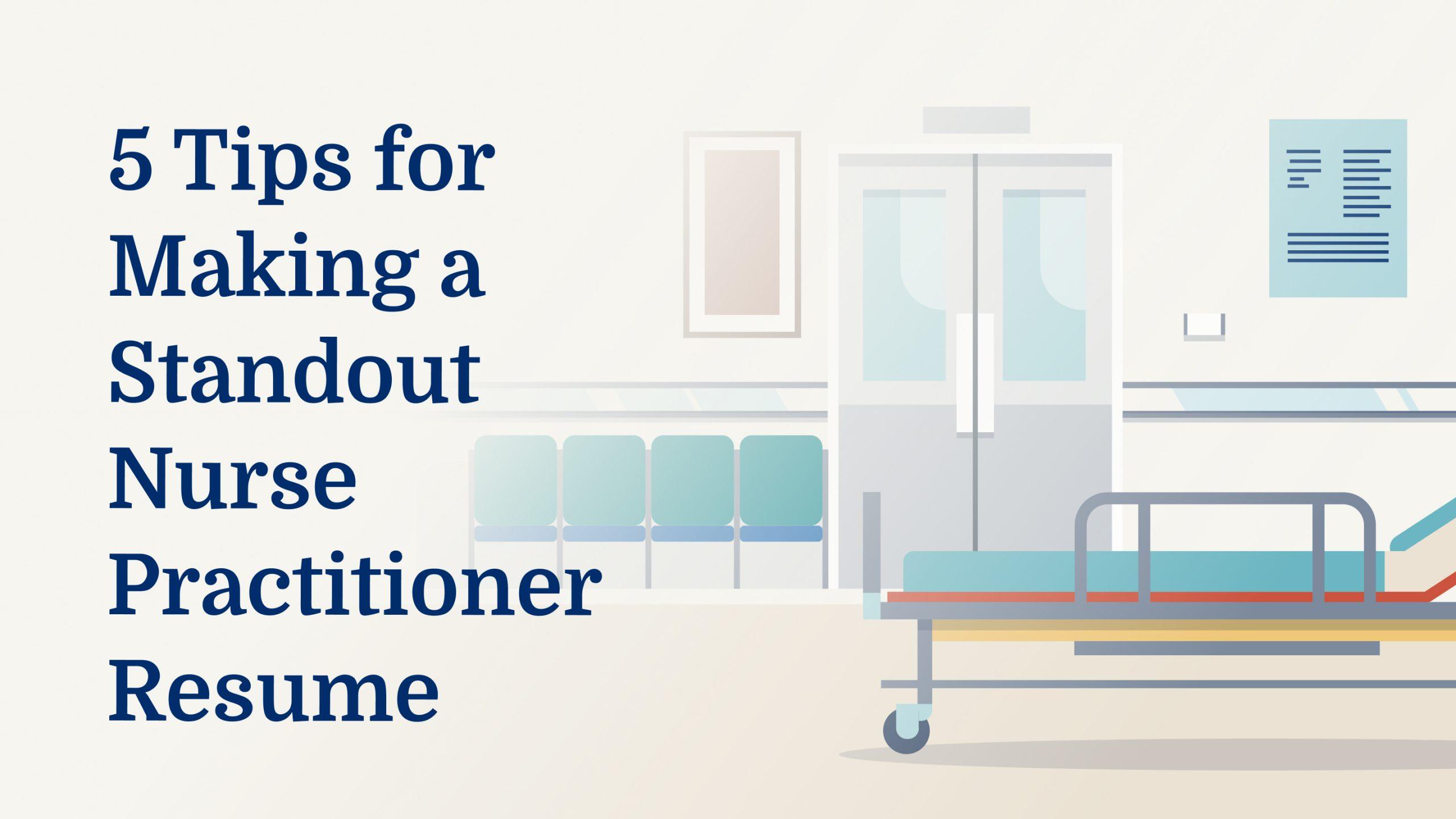
Write a strong professional summary
A professional summary is a concise paragraph at the beginning of your resume that showcases your skills, experience, and achievements.
For a nurse practitioner, this section should highlight your expertise in patient care, diagnosis, and treatment, helping employers quickly see why you are well-suited for the job.
If you have significant experience, use a resume summary to emphasize your key accomplishments and areas of expertise. For instance, mention how many years you’ve worked as a nurse practitioner and any special skills or certifications you possess.
If you’re just starting, use a resume objective to discuss your career goals and what you hope to achieve in the role.
Use action words like “provided,” “managed,” or “developed” to demonstrate what you have done and can do. Emphasize specific skills such as patient assessment, medication management, or health education. Organize this section clearly so it’s easy for employers to read quickly.
Nurse practitioner resume summary examples
Entry-level
Compassionate and dedicated new graduate nurse practitioner with a Master of Science in Nursing (MSN) from San Francisco State University. Board-certified through the American Nurses Credentialing Center (ANCC) and holding a current RN license. Strong foundation in patient assessment, diagnosis, and treatment planning gained through clinical rotations in family medicine and pediatrics. Eager to contribute to a healthcare team focused on providing high-quality patient care.
Mid-career
Experienced nurse practitioner with over 7 years of practice in primary care settings. Proficient in conducting comprehensive patient assessments, managing chronic conditions such as diabetes and hypertension, and developing individualized care plans. Certified Family Nurse Practitioner (FNP-C) with proven ability to improve patient outcomes through evidence-based practice. Recognized for excellent communication skills and dedication to patient education and advocacy.
Experienced
Highly skilled nurse practitioner with more than 15 years of experience specializing in cardiology. Advanced Cardiovascular Life Support (ACLS) certified, with extensive expertise in managing complex cardiac cases, performing diagnostic procedures, and collaborating with multidisciplinary teams to develop advanced treatment protocols. Demonstrated leadership as head NP at El Camino Hospital, driving initiatives that significantly enhanced patient care standards and operational efficiency.
Nurse practitioner resume objective examples
Recent graduate
Dedicated and compassionate recent nurse practitioner program graduate with a master’s degree in Nursing seeking to apply clinical knowledge and patient care skills in a dynamic healthcare setting. Eager to contribute to a multidisciplinary team, providing high-quality care and improving patient outcomes.
Career changer
Motivated healthcare professional transitioning into the nurse practitioner role with extensive experience in patient care as a registered nurse. Committed to utilizing advanced training and evidence-based practices to deliver exceptional patient care and support within a collaborative medical environment.
Specialized training
Certified family nurse practitioner with additional training in pediatric and geriatric care, seeking an opportunity to join a forward-thinking healthcare facility. Passionate about leveraging specialized knowledge and holistic approaches to enhance patient well-being across diverse age groups.
Make your resume stand out by using our Resume Builder to create a professional resume that captures the attention of recruiters and hiring managers.
Include relevant certifications and training
Listing credentials such as certifications, licenses, and specialized training is very important for a nurse practitioner. These credentials show you have the necessary skills and knowledge to do your job well. They also help you stand out from other candidates when applying for jobs.
Creating a dedicated certifications section on your resume will make these achievements easy to find. In this section, list your credentials prominently. This can be an enhancement alongside your education section. For example, include certifications like American Nurses Credentialing Center (ANCC) Certification, Advanced Cardiac Life Support (ACLS), and Pediatric Advanced Life Support (PALS).
Organize them in a clear format: title of certification, issuing organization, and date obtained or expiration date if applicable.
Highlight any specialized training relevant to the job you’re seeking. This practical approach shows employers that you are well-prepared and qualified for the nurse practitioner role.
Example of a certifications section
Family Nurse Practitioner (FNP-BC)
Issued by: American Nurses Credentialing Center (ANCC)
Expires 2025
Certified Pediatric Nurse Practitioner (CPNP-PC)
Issued by: Pediatric Nursing Certification Board (PNCB)
Expires 2024
Advanced Cardiac Life Support (ACLS) Certification
Issued by: American Heart Association
Issued 2022
Basic Life Support (BLS) Certification
Issued by: American Heart Association
Expires 2023
Neonatal Resuscitation Program (NRP) Certification
Issued by: American Academy of Pediatrics
Issued 2021
We recommend using one of our professional resume templates to create a resume that showcases your skills and experience as effectively.
Showcase your work experience
Emphasizing work experience on your resume is essential, particularly for a nurse practitioner. This allows employers to understand your qualifications and real-world application of skills.
Arrange your work history in reverse chronological order, starting with the latest position, detailing the job title, employer’s name, location, and employment dates.
Describe your duties and achievements using clear, action-oriented bullet points. Highlight measurable outcomes to effectively demonstrate your contributions. Include key responsibilities such as diagnosing conditions, prescribing medications, providing patient education, managing chronic illnesses, and performing routine exams.
By organizing this section well and focusing on relevant experiences, you make it easier for hiring managers to grasp your background and recognize why you are a strong candidate for the role.
5 nurse practitioner work history bullet points
- Conducted comprehensive health assessments, diagnosing and managing acute and chronic conditions for a patient base of over 200 individuals, resulting in a 15% improvement in patient outcomes.
- Developed and implemented personalized care plans in collaboration with interdisciplinary teams, enhancing the quality of care for patients with complex medical needs by 20%.
- Educated patients and families on disease prevention, medication adherence, and lifestyle modifications, increasing patient satisfaction scores by 25%.
- Performed minor surgical procedures and diagnostic tests, reducing the need for specialist referrals by 30% and expediting treatment plans.
- Led a community health initiative that provided free screenings and educational workshops to underserved populations, improving community health metrics by 10%.
To get past applicant tracking systems (ATS) and catch recruiters’ attention, use keywords from the job posting in your resume.
Match your resume with the job description
Tailoring your resume to match job descriptions is essential because it helps you stand out to employers and pass through applicant tracking systems (ATS). ATS scans resumes for specific keywords and phrases from the job posting.
You can create an ATS-friendly resume by including keywords and phrases that align with your skills and increase your chances of getting noticed by hiring managers.
Look for skills, qualifications, and duties mentioned multiple times. For example, if the job posting emphasizes “patient care,” “clinical assessments,” or “healthcare team collaboration,” make sure you use these exact words in your resume.
Incorporate these terms naturally into your resume. For instance, if the job description says, “Provide high-quality patient care,” you could reword this into a bullet point like: “Delivered high-quality patient care to improve overall health outcomes.”
Creating a targeted resume improves ATS compatibility and shows that you have the skills and experience needed for the role. Make sure to list relevant skills in a dedicated section and organize your work experience with clear headings and bullet points highlighting achievements related to those key terms.
Make sure your resume gets noticed! Our ATS Resume Checker helps you format it right and use the best keywords, so it passes through application systems.
Salary Insights for Nurse-practitioners
Top 10 highest-paying states for nurse-practitioners (new data)
Nurse-practitioners earn varying salaries across the United States, with a national average of $129,458. The table below highlights the states where nurse-practitioners command the highest compensation.
Our salary information comes from the U.S. Bureau of Labor Statistics’ Occupational Employment and Wage Statistics survey. This official government data provides the most comprehensive and reliable salary information for writers across all 50 states and the District of Columbia. The figures presented here reflect the May 2025 dataset, which is the most recent available as of this publication.
| State | Average Salary |
|---|---|
| California | $173,190 |
| Oregon | $148,030 |
| New York | $148,410 |
| Massachusetts | $145,140 |
| Washington | $143,620 |
| Alaska | $142,340 |
| Connecticut | $141,140 |
| New Jersey | $140,470 |
| Rhode Island | $139,600 |
| District of Columbia | $137,600 |
FAQ
Do I need to include a cover letter with my nurse practitioner resume?
Including a cover letter with your nurse practitioner resume can give you a strong edge. It’s your chance to explain why you’re genuinely interested in the role and how your background aligns with the clinic’s needs.
For example, if the organization emphasizes holistic care or community outreach, sharing relevant experience shows not only your qualifications but also that you’ve done your homework. Refer to our cover letter examples for inspiration.
A cover letter also lets you highlight your passion for patient care and share unique skills or experiences that set you apart. It adds a personal touch to your application and makes it more memorable.
Plus, it’s a great place to address any career transitions or employment gaps with added context. We recommend using our Cover Letter Generator to create an impactful cover letter.
How long should a nurse practitioner’s resume be?
A nurse practitioner’s resume is typically recommended to be one to two pages in length. If you are just starting, a single page effectively showcases your education, certifications, and early work experience.
For those with substantial experience or advanced specialties, a two-page resume is acceptable. Highlight recent and relevant achievements, clinical skills, and any unique qualifications that distinguish you from others.
This approach allows hiring managers to quickly assess your value while keeping the resume length concise and effective.
How do you write a nurse practitioner resume with no experience?
When writing a nurse practitioner resume with no experience, focus on your education, clinical training, and relevant skills. Start by listing your advanced nursing degree (e.g., MSN or DNP) prominently at the top, including the institution name and graduation date, and mention any honors or distinctions you received.
Highlight your clinical rotations in detail by describing specific settings, patient populations, and types of care provided during these rotations. Emphasize hands-on experiences like conducting patient assessments, developing care plans, and collaborating with healthcare teams.
Include certifications such as ACLS, BLS, or PALS to demonstrate your readiness for various clinical situations. Showcase transferable skills from other roles or volunteer work. Skills like patient communication, teamwork, and time management are essential in nursing.
Rate this article
Nurse Practitioner
Additional Resources
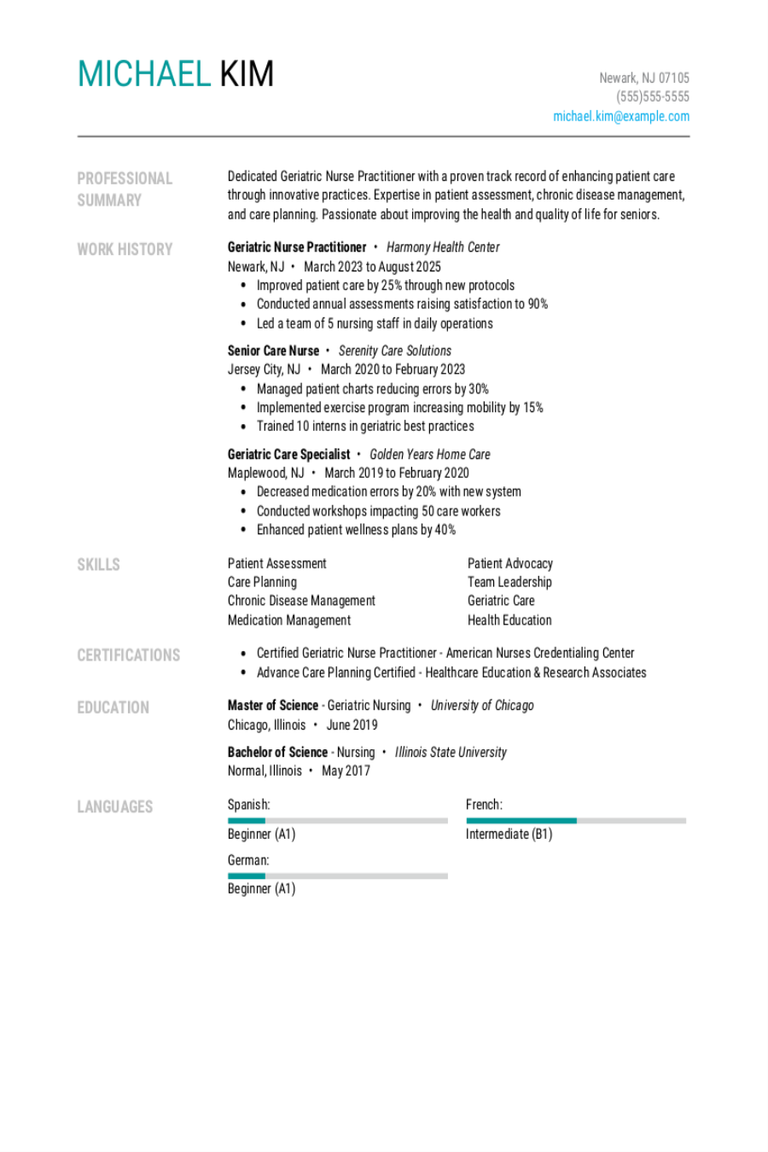
Geriatric Nurse Practitioner Resume Examples & Templates for 2025
Check out how geriatric nurse practitioners highlight their skills in patient care and experience with older adults on their resumes. Use our examples and tips to help you craft a
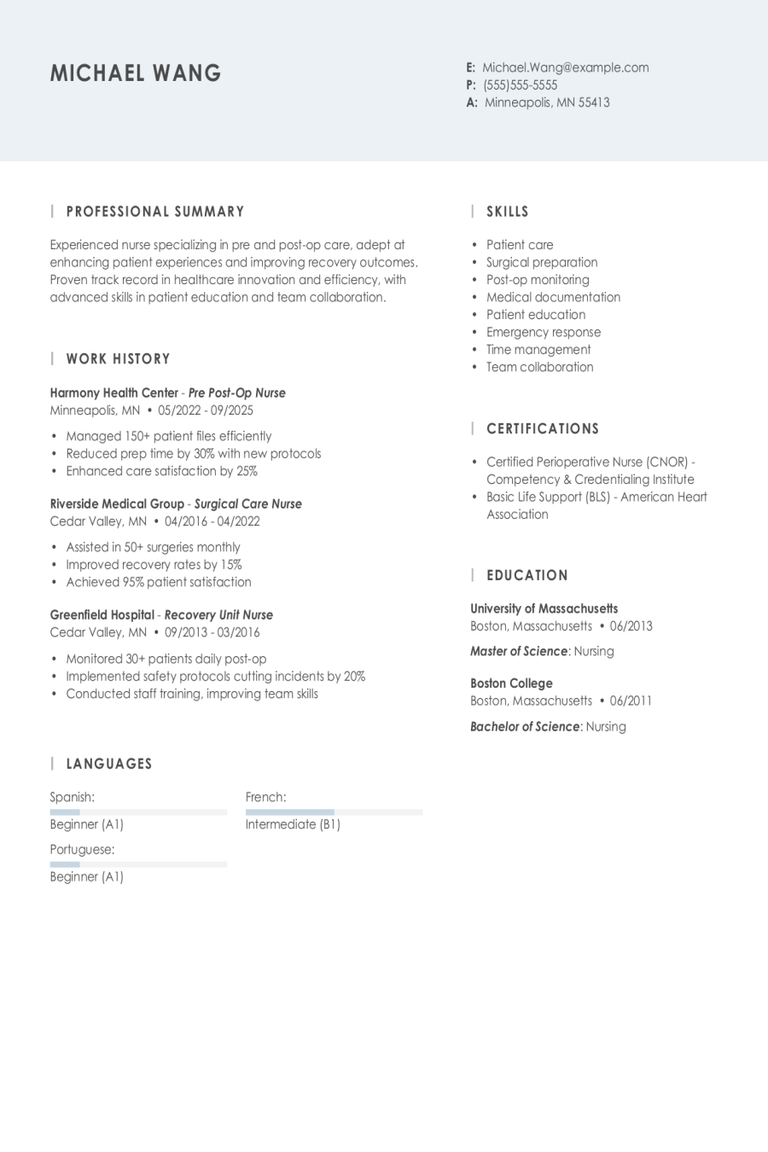
Pre Op/Post Op Nurse Resume Examples & Templates for 2025
These pre op/post op nurse resume examples show how to highlight your skills in patient care and surgical prep. Learn tips for showcasing your experience and making your qualifications stand
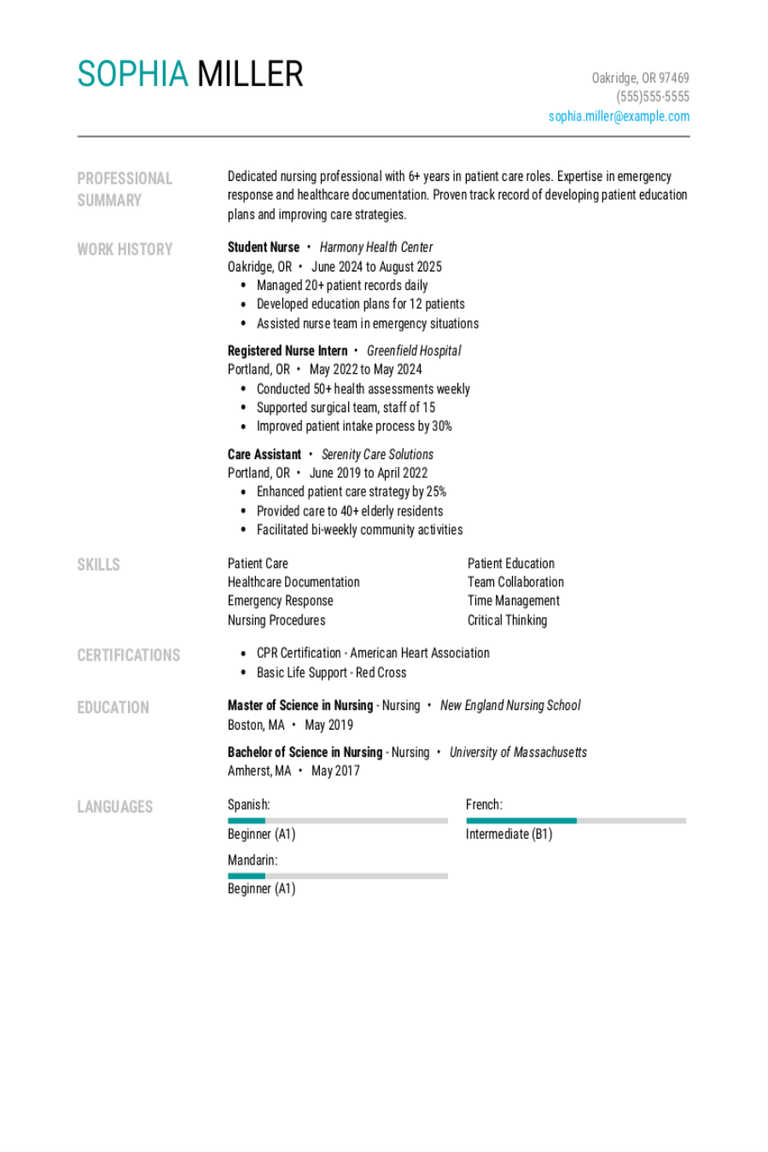
Student Nurse Resume Examples & Templates for 2025
Discover student nurse resume examples that show off patient care, teamwork, and time management. Learn how to present your skills and experiences to stand out in the healthcare field.Build my
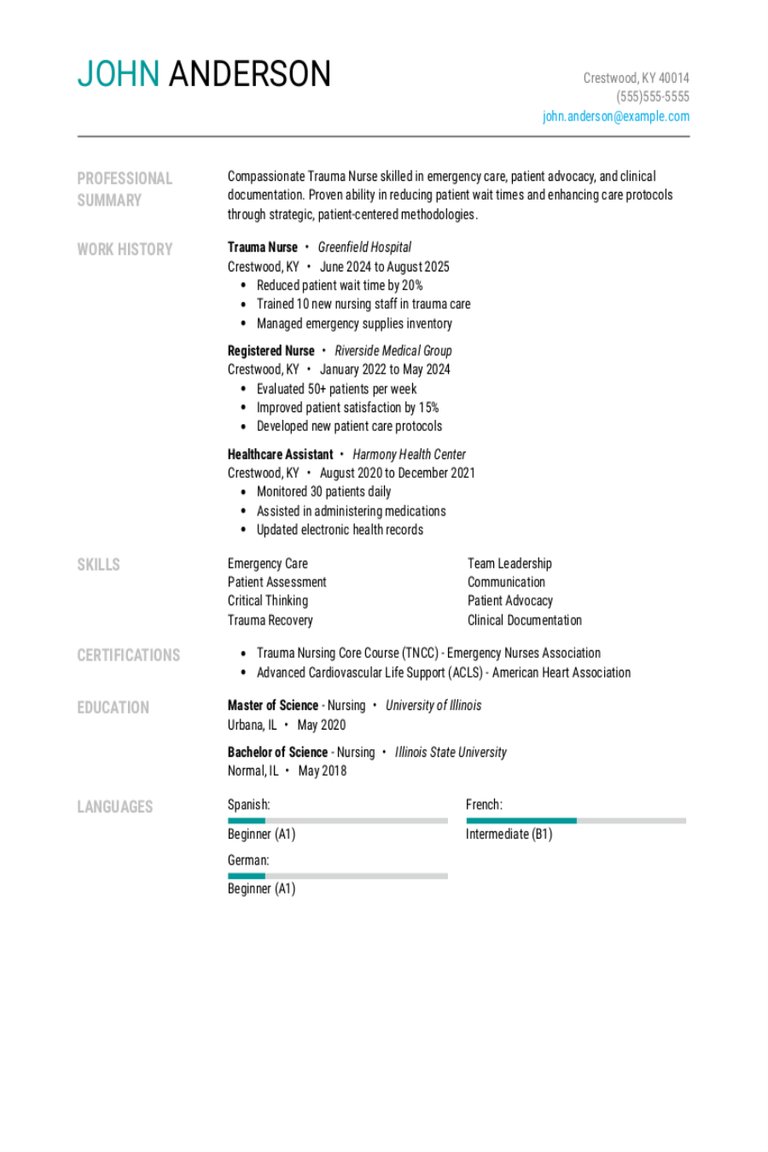
Trauma Nurse Resume Examples & Templates for 2025
Explore trauma nurse resume examples that showcase how to present your emergency care skills and experience clearly. Our tips will help you highlight your fast-paced decision-making and patient care abilities
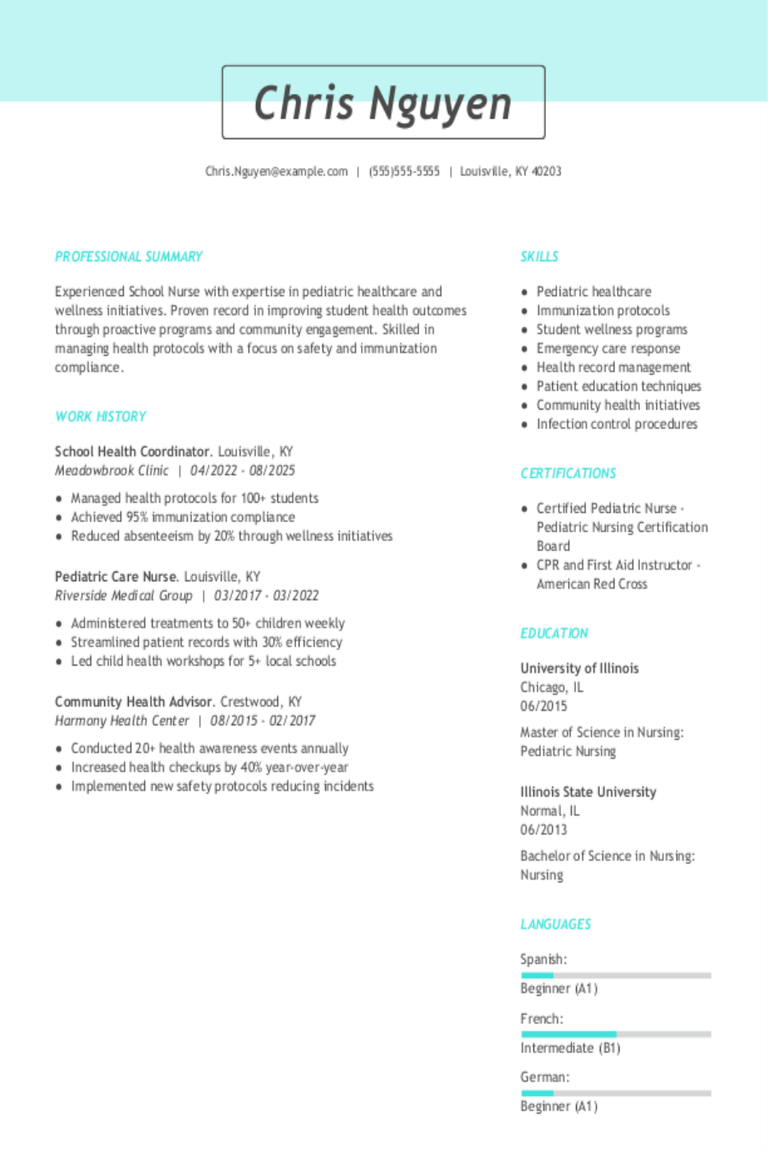
School Nurse Resume Examples & Templates for 2025
As a school nurse, your resume must show how you care for students, manage health records, and handle emergencies. Use our samples to see how to highlight your compassion and
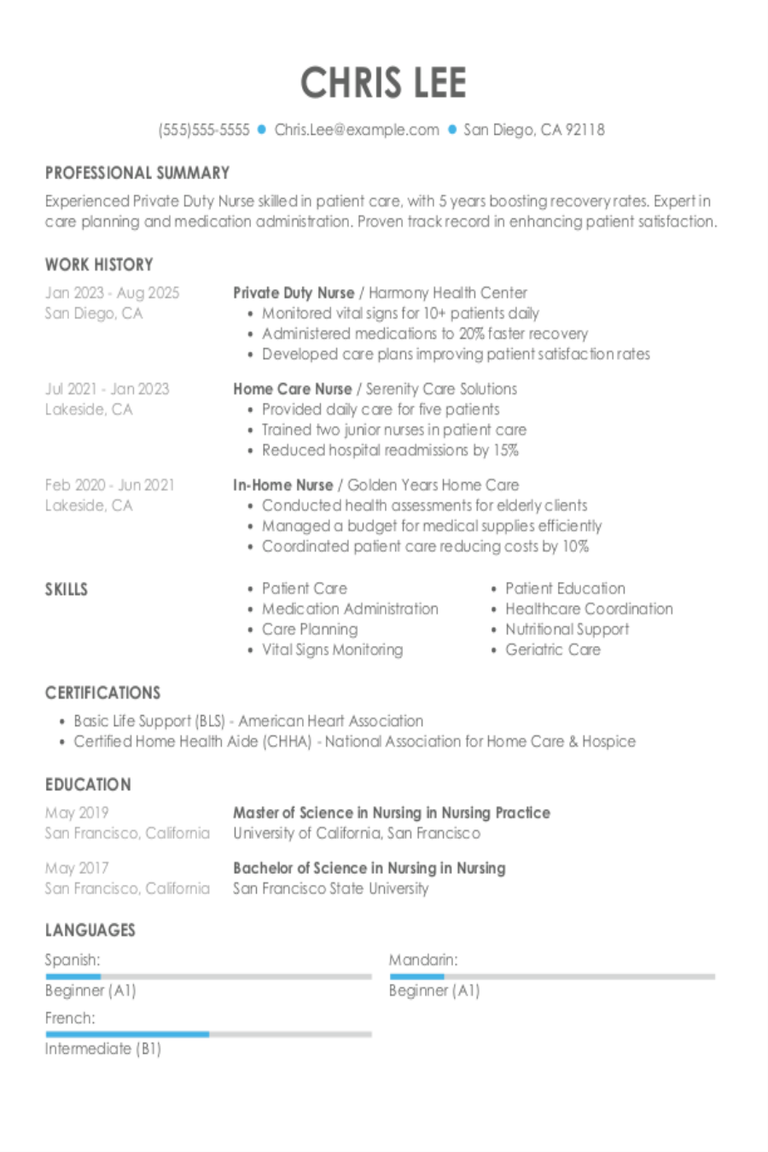
Private Duty Nurse Resume Examples & Templates for 2025
As a private duty nurse, your resume should focus on personalized care, patient advocacy, and strong communication skills. Learn how to highlight your ability to provide one-on-one support and manage
